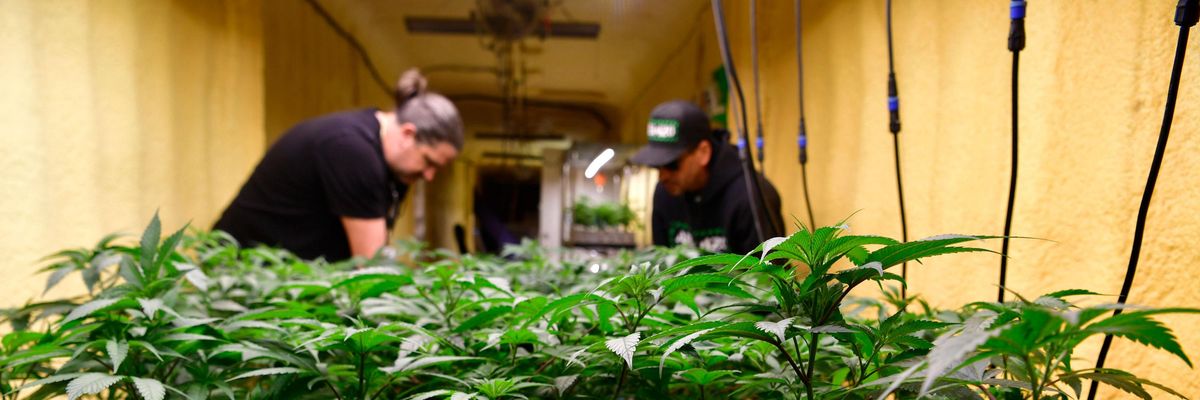Cannabis policy reform campaigners across the United States on Thursday celebrated Senate Democrats' long-awaited introduction of legislation to legalize marijuana nationwide and begin addressing the harms of the decadeslong war on drugs.
"The CAOA would help fuel job growth and increase opportunity for communities most harmed by our country's criminalization of marijuana."
The Marijuana Justice Coalition, convened by the Drug Policy Alliance (DPA), praised the effort that the trio behind the Cannabis Administration and Opportunity Act (CAOA)--Senate Majority Leader Chuck Schumer (D-N.Y.) and Sens. Cory Booker (D-N.Y.) and Ron Wyden (D-Ore.)--put into developing it.
"As a diverse coalition of organizations, we have worked diligently to ensure that issues ranging from criminal justice to immigrant rights to workers' rights and economic justice are included in the bill," the coalition said. "We look forward to going through the proposal with a fine-tooth comb to ensure that the legislative text will best address the decades of harm prohibition has inflicted on people of color and marginalized communities."
Maritza Perez, director of DPA's Office of Federal Affairs, declared that "the significance of this bill finally being introduced in the Senate cannot be understated."
Building on the House-approved Marijuana Opportunity Reinvestment and Expungement Act, the CAOA "would not only deschedule marijuana at the federal level, but it also begins to repair the extensive economic and societal tolls that have been caused by prohibition," Perez noted.
Specifically, as Akua Amaning, director of criminal justice reform at the Center for American Progress, explained, the bill would "correct decades of harms by facilitating the expungement and resentencing of nonviolent federal marijuana convictions."
ACLU senior policy counsel Aamra Ahmad said that "if you want to know what systemic racism is, look no further than the war on drugs and marijuana enforcement--a Black person is 3.64 times more likely to be arrested for marijuana possession than a white person, even though Black and white people use marijuana at similar rates. As a result, people of color are unevenly bearing the burdens of having a marijuana conviction, including difficulty securing housing, employment, education, and public benefits."
Amaning pointed out that "by reinvesting tax revenue from marijuana businesses into the communities most affected by the war on drugs, the CAOA would help fuel job growth and increase opportunity for communities most harmed by our country's criminalization of marijuana."
Sirine Shebaya, executive director of the National Immigration Project, emphasized that the drug war has also "had devastating consequences for immigrant communities."
"Beyond the already harsh criminal consequences of marijuana convictions," Shebaya said, "immigrants are additionally punished through draconian penalties including detention, deportation, and family separation--even in states where marijuana use has been decriminalized."
While several U.S. states and territories have decriminalized and even legalized adult medicinal and recreational use of marijuana, advocates have continued to push for federal legislation--and urged members of Congress to learn from previous local efforts.
"Like Senate Majority Leader Schumer, we believe that federal marijuana legalization should provide opportunities for small and minority-owned businesses, not Big Tobacco and the other 'big boys,'" said Shaleen Title, founder of the Parabola Center.
"However, as state after state has demonstrated, it takes more than just a commitment to equitably implement a framework for legal cannabis. It takes attention to detail, evaluation of evidence, and a willingness to make course corrections," Title added.
Marijuana Moment reported Thursday that the CAOA was formally introduced just over a year after Senate Democrats unveiled a draft version and now "incorporates significant feedback received through more than 1,800 comments."
As the outlet detailed:
[The] main thrust of the now-filed 296-page legalization bill closely resembles that of the earlier version, which weighed in at a mere 163 pages--though the senators highlighted a number of changes, which generally expand on the draft.
For example, there are revisions concerning cannabis industry workers' rights, a federal responsibility to set an impaired driving standard, banking access, expungements, and penalties for possessing or distributing large quantities of marijuana without a federal permit.
The bill would also create a new federal definition for hemp that would increase the permissible THC by dry weight to 0.7% from the current 0.3%, but also make it so all THC isomers would be included in that total, not just delta-9 THC.
Speaking on the Senate floor Thursday, Schumer said that "I am proud to be the first majority leader ever to say that it is time to end the federal prohibition on cannabis, and this bill provides the best framework for updating our cannabis laws and reversing decades of harm inflicted by the war on drugs."
"I've had many productive conversations with my Republican and Democratic colleagues about cannabis reform and I look forward to working with members from both sides of the aisle to secure support for this bill," he continued, outlining the CAOA's key provisions and stressing that "this is the beginning of the legislative process, not the end."
NORML political director Morgan Fox said that "the official introduction of this bill to finally end the policy nightmare of federal marijuana prohibition is the culmination of unprecedented leadership in the Senate and engagement with stakeholders across the political spectrum."
"We look forward to working with lawmakers to move this legislation toward passage and eagerly anticipate engaging in substantive conversations on all aspects of federal marijuana law with Senate members. These conversations and hearings are long overdue," Fox added, noting public support for reform. "Now is the time to figure out how to do that in a way that effectively addresses the damage done to marginalized communities and creates equitable opportunities in the burgeoning cannabis industry."




